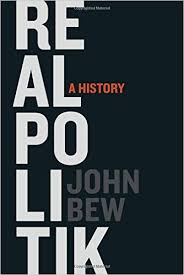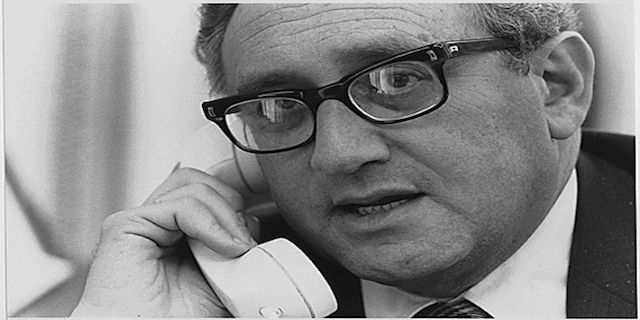Book Review: Realpolitik: A History by John Bew
While ‘realpolitik’ has often been understood negatively, associated primarily with Henry Kissinger and used to denote cynical approaches to foreign policy, this new book by John Bew, Realpolitik: A History, offers a more nuanced history of the term by tracing its development from its initial conception in mid-nineteenth-century Germany to the present day. Robert Ledger applauds this expertly written and fascinating text for showing the importance of considering ideas as embedded within particular, and changing, social contexts. Those who read this work will view ‘realpolitik’ in a new light.
Realpolitik: A History. John Bew. Oxford University Press. 2016.
 Realpolitik: A History, the new book by John Bew, is a study of a much-used, and little understood, term that is deployed generically to denote a cynical foreign policy, and often linked with Henry Kissinger. The author describes the development of realpolitik from its original conception in mid-nineteenth-century Germany through to its association with US foreign policymakers from the 1970s up until the present day. Realpolitik is absorbing history as well as an important examination of political ideas and labels.
Realpolitik: A History, the new book by John Bew, is a study of a much-used, and little understood, term that is deployed generically to denote a cynical foreign policy, and often linked with Henry Kissinger. The author describes the development of realpolitik from its original conception in mid-nineteenth-century Germany through to its association with US foreign policymakers from the 1970s up until the present day. Realpolitik is absorbing history as well as an important examination of political ideas and labels.
John Bew teaches history and foreign policy in the War Studies Department at King’s College, London. His previous books include Castlereagh, a biography of the arch-strategist of British foreign policy at the Congress of Vienna. Realpolitik starts a little later, in the wake of the European revolutions of 1848. German writer and liberal Ludwig von Rochau published The Foundations of Realpolitik in 1853, primarily with domestic politics in mind. The insights he described included that the ‘law of the strong is the determining factor in politics’; that ‘the most effective form of government is one that incorporates the most powerful social forces within the state’; that ideas matter depending on how they influence society; and finally that public opinion or the Zeitgeist (the ‘spirit of the age’) is crucial in determining a nation’s direction (32). For Rochau, utopianism was folly but liberal ideals were important. Originally realpolitik had an analytical element, whereby political realities had to be taken into consideration before longer term goals could be reached. Rochau believed that the pursuit of higher aims was compatible with short-term goals (54).
Realpolitik then explores how these initial principles developed, through German unification and the foreign policy of Bismarck, into the twentieth century. A consistent theme is that the nuances of Rochau’s Foundations were quickly lost, becoming synonymous with value-free pragmatism and a cynical, Machiavellian pursuit of power. A number of German thinkers adopted the term realpolitik, and all deviated from Rochau’s principles. Heinrich von Treitschke, for instance, popularised realpolitik and infected it with his anti-Semitism and nationalism. By the turn of the century there was also a linkage with German weltpolitik (overseas expansion) and machtpolitik (the politics of force).
How interpretations of realpolitik became absorbed into the lexicon of political discourse in the English-speaking world is discussed at length. The British came to see it as interchangeable with German skulduggery during the First World War years and later, in the 1930s, as a return to Castlereagh’s statecraft in pursuing fascist appeasement. Bew points out how hypocrisy was never far away, for instance in Britain and France’s 1916 Sykes-Picot Agreement, which carved up the Middle East.
Perhaps most important was the influence of German realpolitik on writers and politicians in the United States. Whereas in Britain the term had been viewed mainly in a negative fashion, Americans saw things differently. During the First World War, journalist Walter Lippmann set out how the US could deploy self-interest and ‘robust liberal internationalism’ to reshape the global order in its own favour (130). This line of thinking came to influence Cold Warriors such as George Kennan – who famously outlined a policy of containment towards the Soviet Union – and Dean Acheson, Secretary of State under Harry Truman. Concurrently, the new discipline of international relations, and in particular the ‘realist’ school, made an impact on US foreign policy. Realists such as Hans Morgenthau, Reinhold Niebuhr and Kenneth Waltz were all prominent during this period. Bew describes how these thinkers shared some lineage with German realpolitik as well as significant differences. For instance, Waltz’s scientific realism – sometimes called structural or neo-realism – puts little emphasis on historical and cultural factors.

Credit: US Secretary of State Henry A. Kissinger uses the telephone in Deputy National Security Advisor Brent Scowcroft’s office to get the latest information on the situation in South Vietnam, 29/04/1975. White House Photographic Office. (NARA)
This will be enlightening for those of us who have tended to use terms such as ‘realpolitik’, ‘geopolitics’ and ‘realism’ interchangeably. In addition, many readers will most readily identify the concept with the policies of Henry Kissinger, as National Security Adviser and then Secretary of State under Presidents Richard Nixon and Gerald Ford. Although Kissinger rarely used the term himself, his grand strategy as well as his academic career were obviously linked to the tradition. A number of policies under Kissinger’s watch seemed to favour political contingency over human rights: for instance, backing authoritarian allies from General Pinochet in Chile to the Shah of Iran, as well as bombing North Vietnam to the negotiation table. Jimmy Carter’s emphasis on human rights was a reaction to the dark arts of the Kissinger years. Nevertheless, it is worth pointing out that the third ‘basket’ of the 1975 Helsinki Final Act was signed while Kissinger (however sceptical he may have been) was still in office and made provisions for human rights protections, a factor some have identified as a precursor for the people power in the communist bloc a decade later. In this respect, it was pure Rochau: a short-term compromise with one eye on a long-term ideal.
As well as being a fascinating and unique historical work, Bew’s book is an important study of the development of political ideas and the terms they encapsulate. Ideas must be considered in the context of time, location and cultural factors. Realpolitik aptly demonstrates how ideas are manipulated and polarised, in this case into realpolitik and anti-realpolitik strands. The reality is one of graduation and interpretation. Neither ideals, self-interest nor political reality can be absent from domestic or foreign policy.
Bew concludes by returning to Rochau’s original realpolitik. As an analytical tool, it is highly relevant and hard not to escape the conclusion that these principles would have proven useful in a number of contemporary scenarios, the Arab Spring being just one example. Realpolitik: A History is an expertly researched and written book. It will appeal to academics and students interested in nineteenth- and twentieth-century European and US history, foreign policy and the history of international relations. Having read it, you will never use the term in quite the same way again.
—
This post originally appeared on the LSE Review of Books. It represents the views of the author and not those of Democratic Audit UK or the LSE. Please read our comments policy before posting.
—
Robert Ledger has a PhD from Queen Mary University London in political science, his thesis examining the influence of liberal economic ideas on the Thatcher government, and an MA in International Relations from Brunel University. He has worked in Brussels and Berlin for the European Stability Initiative – a think tank – on EU enlargement and human rights issues. He has published widely on European and British politics, edited the Journal of International Relations Research and is also a regular contributor to Global Risk Insights, a political risk group. Read more reviews by Robert Ledger.





 Democratic Audit's core funding is provided by the Joseph Rowntree Charitable Trust. Additional funding is provided by the London School of Economics.
Democratic Audit's core funding is provided by the Joseph Rowntree Charitable Trust. Additional funding is provided by the London School of Economics.
Book Review: Realpolitik: A History by John Bew https://t.co/xmsRs1vSAF
Book Review: Realpolitik: A History by John Bew https://t.co/L6G6L2PhsD
Book Review: “most effective form of govt is one that incorporates the most powerful social forces within the state”
https://t.co/TEvO87pMmI
Book Review: Realpolitik: A History by John Bew – Democratic Audit UK https://t.co/3TCZZPJGIW
Book Review: Realpolitik: A History by John Bew https://t.co/riNHIZpqoY https://t.co/PYP3HywC6D